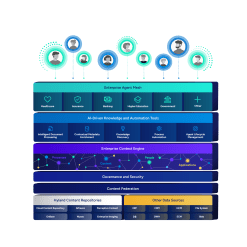Mercy Health Systems
Healthcare company integrates Drupal with Hyland's Alfresco platform to deliver one unified location where all 38,000 employees can access up-to-date information.

Harness the power of a unified content, process and application intelligence platform to unlock the value of enterprise content.
Learn more
Automate your document-centric processes with AI-powered document capture, separation, classification, extraction and enrichment.
Learn about Hyland IDPIt's your unique digital evolution … but you don't have to face it alone. We understand the landscape of your industry and the unique needs of the people you serve.
 Overview of industries
Overview of industries
Countless teams and departments have transformed the way they work in accounting, HR, legal and more with Hyland solutions.
 Overview of departments
Overview of departments
We are committed to helping you maximize your technology investment so you can best serve your customers.
 Overview of services
Overview of services

Discover why Hyland is trusted by thousands of organizations worldwide.
Hear from our customers
Our exclusive partner programs combine our strengths with yours to create better experiences through content services.
Overview of partners
Join The Shift newsletter for the latest strategies and expert tips from industry leaders. Discover actionable steps to stay innovative.
Register now
Hyland connects your content and systems so you can forge stronger connections with the people who matter most.
Learn about HylandWith our modern, open and cloud-native platforms, you can build strong connections and keep evolving.
 Dig deeper
Dig deeper
Reading time minutes
Healthcare company integrates Drupal with Hyland's Alfresco platform to deliver one unified location where all 38,000 employees can access up-to-date information.
Mercy Health Systems (Mercy) is a partnership of over 400 healthcare providers, including hospitals and clinics, throughout the Midwest. Each location had its own intranet site that used a mix of different technologies and relied on separate support structures.
It was determined that a single unified portal was needed to support the organization's vision of "One Mercy." A portal project called "Baggot Street Portal" was created to serve as the main hub for all of Mercy's 38,000 employees. That meant all documents and other content from the many other disparate intranets had to be migrated into Baggot Street.
Requirements for Mercy's Baggot Street included unique workflow functionality for the creation and approval of policies and forms used by many employees throughout the network of hospitals.
They needed a workflow process that would create rules based on information about the document and department. The user would then choose the people who needed to approve the workflow, with the department head always getting final approval.
— Arnold Leung, CEO, Appnovation
Mercy built Baggot Street using open-source technology and had previously selected Drupal as its web content system. Drupal provided a high-end framework with extensible functionalities and was satisfactory until Mercy needed to migrate documents into Baggot Street. Out of the box, Drupal didn't provide a document management solution flexible enough to meet Mercy's business requirements.
In need of a content repository, Mercy compared SharePoint and Hyland's Alfresco platform, evaluating ease of integration, ability to support the enterprise, usability and cost. Mercy determined that Alfresco was the best document repository to serve as its backend content repository for all of its Drupal web properties.
Mercy worked with Alfresco partner Appnovation to leverage its Canopy solution, which provides a set of services and APIs used to accelerate the integration of Drupal and Alfresco in an enterprise environment. Canopy combines the flexibility of Drupal as a front-end web development platform with the power of Alfresco as an enterprise content management and workflow system.
The Appnovation team developed the foundation for Baggot Street, which required setting up an inventory of Canopy modules and CMIS integration points. Appnovation developed several custom REST-based web scripts to batch certain operations, serving as a bridge for synchronizing group nodes, group members, taxonomy terms and department/sub-department nodes between Drupal and Alfresco. As a result, content is able to be synchronized in real time.
To provide a faceted search on documents through Alfresco, Mercy embedded the Apache Solr module. For Apache Solr to index documents from Alfresco, the CMIS API was used to retrieve documents in Alfresco. Once the documents are available in Drupal, they are saved as an Alfresco document node and indexed by Apache Solr.
To provide users the ability to upload documents from Drupal to Alfresco, a CMIS API was created. Form documents required custom web scripts to initiate the workflow in Alfresco. Using CMIS to upload either document types triggers a workflow rule to establish the metadata. The reviewer can then specify multiple users to review, with the department head getting final approval. Once complete, the document can be published on the portal.
With the Alfresco platform and Drupal, Mercy now has one unified location where all 38,000 employees can access information across Mercy's various locations and data stores.
Mercy worked closely with Appnovation during the delivery process to ensure the new portal met all of the organization's document management and workflow needs.
Appnovation developers provided one-on-one training to Mercy developers and extended exceptional support regarding code logic and implementation.